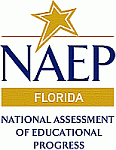School Improvement, Accountability, and Testing
Page Navigation
-
National Assessment of Educational Progress (NAEP)
NAEP is The Nation's Report Card
 The National Assessment of Educational Progress (NAEP),
often referred
to as The Nation's Report
Card, and long considered the gold standard in assessment development,
is the only continuing, nationally
representative,
state-comparable measure of student achievement.
The National Assessment of Educational Progress (NAEP),
often referred
to as The Nation's Report
Card, and long considered the gold standard in assessment development,
is the only continuing, nationally
representative,
state-comparable measure of student achievement.
- Established by Congress in 1969 as a national assessment and administered by the assessment division of the National Center for Education Statistics (NCES), a division of the U.S. Department of Education, the Institute of Education Sciences. Voluntary assessments for states began in 1990 on a trial basis. Since 2002, selected urban districts have participated in the Trial Urban District Assessment (TUDA). Beginning with the 2002-2003 NAEP administration, as part of the Elementary and Secondary Education Act Reauthorization of 2001 (No Child Left Behind Act), all states, the District of Columbia Public Schools, and the Department of Defense Education Activity schools were required to participate in mathematics and reading assessments. P.L. 107-279, Sec. 303, signed by President Bush on November 5, 2002, established NAEP as a fair and accurate measure of the nation's student academic achievement and provided reporting trends in subjects such as mathematics, reading, science and writing. Other subjects, such as the arts, civics, economics, geography and U.S. history, are assessed periodically at the national level.
- Authorized in Florida by Florida State Statute 1008.22(2), NAEP is included as part of Florida's statewide assessment program because it provides comparative state and national information about student achievement in mathematics, reading, science, vocabulary and writing. A representative sample of students is assessed as a means of measuring and reporting progress in student performance over time and to compare the knowledge and skills of students in Florida with those of other jurisdictions and with the nation.
- Governed by the National Assessment Governing Board (NAGB), whose board members are appointed by the Secretary of Education, but who are independent of the U.S. Department of Education and responsible for setting policy for NAEP as well as for developing the frameworks and test specifications that serve as the blueprint for the assessments.
Results provides the latest reports for Reading, Mathematics, Science, Vocabulary, Writing, TUDA and Grade 12. A Mega-States Report is also available that compares Florida's results with those of California, Illinois, New York, Texas and the Nation.
Assessments in the NAEP Program
The NAEP Program is divided into two groups of assessments:
- Main NAEP (includes the National, State, and Trial Urban District Assessments) - National NAEP reports information for the nation. State NAEP, first implemented in 1990 on a trial basis, provides state-level assessment results on the performance of students in a range of subjects in grades 4, 8, and 12. The Trial Urban District Assessment (TUDA) NAEP, first implemented in 2002, provides district-level assessment results for 21 large urban districts including Duval, Hillsborough, and Miami-Dade counties in Florida.
- Long-Term Trend NAEP (LTT) - Long-Term Trend NAEP assessments are designed to provide information on the changes in the basic achievement of students in mathematics and reading from the early 1970s to the present. They are administered nationally and report on student performance at ages 9, 13, and 17. The LTT NAEP page includes information about taking the assessments, assessment schedules, results, and resources for participating schools.
To show the differences between the two assessments, a comparison of the assessments in the NAEP program (PDF) is available.
NAEP Resources and Archived Information
NAEP FAQs and Chronology of NAEP (PDF) provide background information about NAEP.
NAEP Archive provides reports, presentations and newsletters related to NAEP and international assessments.

